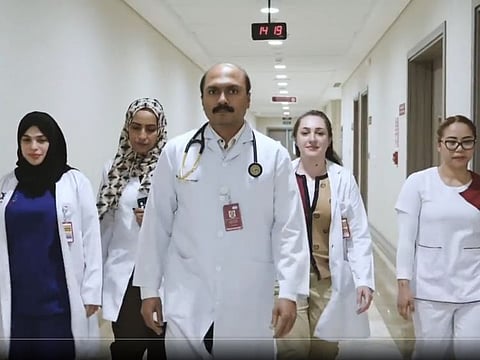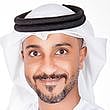Video: UAE celebrates its first-ever Emirati Medical Day to honour healthcare workers
Occasion highlights contributions, sacrifices of medical professionals in the country

Abu Dhabi: They have spent years studying and developing their skills, and most recently, they’ve shown exceptional levels of commitment during a global pandemic. As the UAE focuses on transforming its healthcare sector, the country is therefore offering a vote of thanks to its many medical professionals on the first Emirati Medical Day.
The occasion, which will now be marked every year on May 9, aims to honour healthcare workers in the UAE, and recognise their contributions to society.
Speaking to Gulf News, Emirati healthcare professionals said on Emirati Medical Day that this kind of acknowledgement goes a long way towards keeping them motivated and inspired.
Countless sacrifices
“Ever since I was young, I knew I would be a doctor. My mother would always point to doctors, even when I was very small, and tell me I would one day be like them. So I never questioned my choice of further studies, and spent years studying medicine so I could serve my country and also make my family proud. But it does require years of sacrifice: I was away from home for nearly two decades, and this is not a small commitment,” Dr Humaid Al Shamsi, director of oncology at healthcare provider, VPS, told Gulf News.
“In the same manner, healthcare professionals spend years honing their skills, and work under tremendous pressure. The pandemic did not make things easier in the previous few years, so public appreciation is always welcome,” he added.
Appreciation for all
Across the world, the disaffection of healthcare workers has become a common concern following the COVID-19 pandemic, especially as many healthcare workers have had to make, or witness, personal sacrifices as part of their job. These challenges have added to years of commitment towards their profession.
This year, Emirati Medical Day will be celebrated under the theme, ‘The UAE Appreciates You’. It will highlight the selfless contributions and dedication of healthcare workers in the country, both Emirati and expat.
Years of training
Dr Al Shamsi, now aged 43, returned to the UAE in 2017, after having spent nearly two decades studying medicine in Ireland, Canada and the United States. He chose to specialise in Oncology, knowing that there were very few Emirati doctors in cancer treatment and care.
“I wanted to transform healthcare in the UAE, and had to remain clear and focussed on my goal, especially as I often come across people who compared Emiratis unfavourably to their peers. Fortunately, I had tremendous support from our government,” Dr Al Shamsi recollected.
Dr Abdulla Al Rahoomi, consultant in sports medicine, physical medicine and rehabilitation at Healthpoint, part of the Mubadal Health network, echoed Dr Al Shamsi when he described the biggest challenge he has faced in his journey towards becoming a doctor.
Away from family

Fortunately, his father is now well, and Dr Al Rahoomi treasures his father’s pride at seeing his son excel as a doctor.
“[After all], my whole story starts with my father, who has been my idol and role model throughout my life. He was a nurse who worked in different hospitals and establishments in the UAE and Saudi Arabia. He had a lot of respect for healthcare specialists, and had a dream that one of his children would become a doctor. Naturally, as a child and with such a powerful influence, I developed an interest in the studying medicine,” he said.
Although he was always supported by his family, particularly his father, Dr Al Rahoomi mentioned that the path has not been without obstacles.
“In particular, I have had to demonstrate that Emirati doctors are as good as their international peers. So, I chose to do my specialty and subspecialty abroad, and lived for almost 10 years away from my family and friends, in order to acquire the necessary knowledge and expertise required to treat my patients in the best way possible,” he said.
Greatest joys
Despite these sacrifices, healthcare professionals say some of their greatest happiness arises from seeing their patients do better.
“My greatest joy comes from the success of my patients when they achieve the goals that we set out together at the beginning of their rehabilitation program. Usually, this means seeing my patients take their first steps, and have them leave the hospital walking,” said Aisha Al Zaabi, physiotherapist at Amana Healthcare.
Al Zaabi first became interested in medicine when an Emirati physiotherapist helped her recover from an injury as 15-year-old.
“At the time, I never knew that physiotherapy as a profession existed until I was referred to a young Emirati physiotherapist who treated me. Back then, it wasn’t common to see Emirati clinicians. Her care and expertise left a lasting impact on me, and I remember being impressed by her skills. The irony was that the same therapist who treated me 15 years’ prior, ended up being my clinical educator during my studies,” Al Zaabi recollected.
Multiple challenges
When she eventually chose to pursue medicine, Al Zaabi had to clinician had to convince her parents that she was ready to take on the long hours, and the years of training, that would come with it.
“My father was not initially convinced, and he wanted me to get into a more comfortable job. I love challenges though, and I asked my father to accompany me as I interviewed physiotherapists at their workplaces as part of my own research. When he saw how much I wanted to become a physiotherapist, my father told me it was my decision, and I would have to full responsibility for it,” Al Zaabi said.
Her father is now very proud of her, but Al Zaabi still faces a steep learning curve as a female physiotherapist in a relatively young country.
“I have learned that I need to continually improve every day, and have access to clinicians from different parts of the world to learn from,” she added.
Sign up for the Daily Briefing
Get the latest news and updates straight to your inbox


